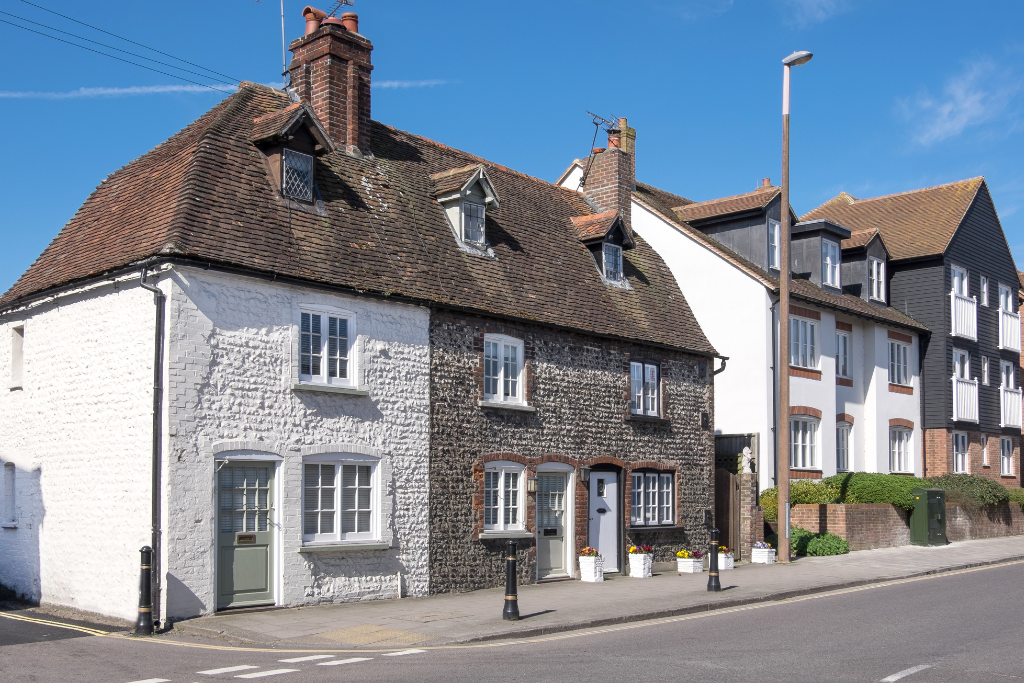Purplebricks house valuation vs estate agent
Looking at which is better: a Purplebricks valuation or an estate agent valuation
Sell your house in 28 days
WRITTEN BY: Tom condon ★ Digital Content Writer


Purplebricks house valuation vs estate agent
Looking at which is better: A Purplebricks valuation or an estate agent valuation
Sell your house in 28 days
WRITTEN BY: Tom Condon ★ Digital Content Writer


Table of Contents
Purplebricks is one of the first online estate agencies to make the “super-brands” list, and are well known for their distinctive branding and widespread recognition.
They offer a model designed to save homeowners thousands of pounds compared to traditional estate agents. Operating 24/7 with comprehensive online account management, they provide a level of convenience that many find appealing.
Purplebricks stands out as one of the most recognisable and well-branded online estate agencies. But how does the Purplebricks house valuation measure up to estate agents? In this article we delve into who Purplebricks are, the pros and cons of using their service, and how they stack up against other estate agents.
The difference between Purplebricks and estate agents
Purplebricks (formerly Strike) is an online estate agent offering house valuations and advert placements on major UK property portals such as Rightmove and Zoopla. They provide a basic service, but much of the selling process is left to the homeowner. Additional services, like hosted viewings or upgrading adverts, are available for an extra fee.
High street estate agents, on the other hand, offer a more hands on approach. Their standard package typically includes accompanied viewings, professional photos and floorplans. They often operate on a ‘no sale, no fee’ basis, meaning you only pay once your home is sold, usually as a commission – 1% to 3% +VAT of the final selling price.
Recently, Purplebricks relaunched its services after being bought by Strike for £1, promoting their ability to sell your home for free. In reality, they provide a basic package at no cost but charge for “optional” extras.
However, traditional and online estate agents are not the only options. Modern estate agents, also known as hybrid estate agents, offer a different approach. For example, here at The Property Selling Company, we provide a completely free selling service, ensuring you won’t have to pay anything, regardless of the amount of marketing your home requires.
Is it worth using an estate agent instead?
While both Purplebricks and traditionale estate agents have their advantages, The Property Selling Company stands out for offering a cost-free, comprehensive and hassle-free estate agency solution.
Using an estate agent is ideal if you want to maximise your profit from selling your house, but be prepared for the process to take over three months. Purplebricks on the other hand, can be a good option if your house is already in high demand and needs only a small push to sell.
However, if your home struggles on the market, you will have to pay for additional services. The selling process with Purplebricks can take up to two months to complete.
Choosing us means benefiting from the best aspects of both online and traditional approaches without the financial burden, making it a smart and practical choice for homeowners looking to sell their homes quickly.
Sell to a regulated estate agent
How to get a Purplebricks house valuation
Purplebricks’ house valuation process can be somewhat misleading. Although their website claims to offer both online and in-person valuations, the actual service is more complex. They promote a virtual valuation that supposedly happens ‘in a click of a button,’ but in reality, you need to sign up and schedule a video appointment for a comprehensive evaluation of your home.
To obtain this virtual valuation from Purplebricks, follow these steps:
- Visit their website: Go to the Purplebricks website.
- Book a free valuation: Click on the ‘Book a free valuation’ button.
- Agent contact: An estate agent will then contact you to arrange the virtual valuation.
Additionally, be cautious of the term ‘local estate agent’ on the Purplebricks website. Purplebricks operates from a single headquarters in Colchester and does not have local offices.
When comparing Purplebricks to other estate agency services, you will usually encounter either an online house valuation tool or an in-person valuation. The online house valuation tool offers a rough estimate based on recently sold homes in your area.
It can be handy for a quick, general idea of your home’s value, but only using basic data and does not consider your home’s specific condition or unique features, making its valuation less accurate and reliable.
In contrast, an in-person house valuation involves an estate agent visiting your home for a thorough evaluation. This process includes assessing the current condition of your home and considering any unique features or improvements that might affect its value.
At The Property Selling Company, we utilise both online and in-person valuations to ensure an accurate and reliable estimate of your home’s value. Our process begins with an online house valuation, providing you with an initial estimate of what we can expect to achieve for your home.
Following this, we conduct an in-person survey to thoroughly assess your home’s condition and unique features. This comprehensive approach supports buyer confidence and helps minimise the risk of your sale falling through.
Do Purplebricks charge for valuations?
Purplebricks offers house valuations free of charge, as do most estate agents, since this is a standard part of the onboarding process. However, be cautious of the possibility of overvaluation, a tactic some estate agents use to win your business.
This unethical practice can mislead you about your home’s true market value. To avoid this, it’s advisable to obtain at least three valuations and compare them to ensure there are no significant discrepancies.
Do Purplebricks take a percentage?
Purplebricks offers various packages for selling your home, each with different features and pricing structures. But, they do not charge a commission based percentage fee. Here’s a breakdown of what they provide:
Purplebricks allow you to sell your home without any upfront costs, this package includes:
- Valuation & report: Insights about your home and area.
- Listing on Zoopla: Your home is showcased on Zoopla, but not Rightmove.
- Viewing management app: Manage your viewings, offers and communicate with buyers.
- Professional negotiation: Ensure you get the best possible price for your home.
- Support team: A team of experts assists you at every step.
Don’t worry if the sell your house for a free option isn’t good enough, because now you get to pay for basic services which are normally free!
- Hosted viewings: £899.
- Rightmove listing: £399.
- Rightmove featured property: £149.
- Rightmove premium listing: £125.
- EPC: £119.
- Professional photography, virtual tour & floorplan: £699.
- Elevated photography: £99.
- Drone photography: £199.
For properties that are struggling to sell, the Boost package offers additional features to help your home stand out. The boost package costs £899 :
- Professional photography: Normally a basic service, professional photography can make your house ‘pop’ online.
- 360 Virtual tour: A virtual tour of your home can help buyers who live further away.
- Professional floor plan: Another basic service, floor plans can help buyers work out how much space is available.
- Premium Rightmove listing: Increased visibility on Rightmove.
- Mortgage advice: Not included in the boost price, costs £149.
For total support, the Full house package costs £1499, including everything above, and everything below:
- Hosted viewings package: Normally a basic estate agent service, professional viewings managed by Purplebricks.
- Expert mortgage advice: Worth £299, included within the package.
Do Purplebricks use Zoopla?
Yes Purplebricks uses Zoopla as their primary property portals. Listings on Zoopla are included for free as part of their standard service, with no additional charges unless you choose to invest in paid advertising options.
In contrast, Rightmove (the larger portal) is included in Purplebricks’ Boost package, which comes at an additional cost.
So, is Purplebricks free?
Purplebricks markets itself as a cost-effective alternative to traditional estate agents, offering a ‘free’ selling package that includes a house valuation, listing on Zoopla, a viewing management app, professional negotiation and expert support.
However, while the initial valuation and basic listing come at no charge, additional services such as hosted viewings, Rightmove listings and professional photography incur extra costs. Purplebricks does not charge a commission fee, but their various service packages and optional add-ons can add up.
Their approach can be somewhat misleading, as what appears to be a simple, free service can quickly become more expensive with necessary add-ons for a comprehensive selling experience. Therefore, while you can technically sell your home for free through Purplebricks, achieving the best results may involve additional expenses.
The Property Selling Company on the other hand, offers a superior and more transparent home-selling experience compared to Purplebricks and traditional estate agents, here’s why:
Unlike Purplebricks, which charges for additional essential services, The Property Selling Company provides a completely free house selling service. You won’t pay any fees, hidden or otherwise, ensuring you keep more of your home’s sale price.
The Property Selling Company uses both online and in-person valuations to give you an accurate and reliable home valuation. This dual approach ensures that all aspects of your home, including this condition and unique features are considered, leading to a more precise valuation.
The Property Selling Company includes all necessary services in their offering without additional charges. This includes professional photos, floorplans, and hosted viewings. In contrast, Purplebricks charges extra for many of these essential services, which can add up quickly.
With The Property Selling Company, you can sell your home in as little as 28 days. This quick turnaround time is beneficial for those looking to sell their home without the lengthy process typical of traditional estate agents or the potential delays with purplebricks.
Purplebricks valuation vs estate agent
Choosing between an estate agent and Purplebricks ultimately depends on your personal preference and priorities.
Traditional estate agents offer a more hands-on selling experience, as they possess local knowledge and provide services such as professional photography, hosted viewings and detailed floor plans, making sure your home is presented at its best.
High street estate agents also use their extensive local knowledge to provide reliable and accurate house valuations. By considering the local area as well as the condition of your home, they can give you a realistic house value.
However, this complete service often comes with higher fees, usually in the form of a commission based on the final selling price.
Purplebricks, on the other hand, may be a cheaper option due to their fixed-fee structure. However, their more hands-off approach means you might get less for your money, and means you will need to do a lot more work. Essential services come at an additional cost, which increases your expenses.
The reliability of Purplebricks’ valuation services can be mixed. While they offer a free initial valuation and a detailed report, their use of virtual valuations and online tools might not always capture the specific nuances of your home. This can lead to valuations that may not be as accurate as those provided by high street estate agents.
However, there is good news. At The Property Selling Company, we offer a method that helps guarantee a sale without any upfront costs. Our comprehensive service ensures you receive expert support and professional marketing, all while eliminating the financial burden associated with selling a home.
Do estate agents give different valuations?
Yes, estate agents often provide different house valuations. This variability is mainly due to the subjective nature of house valuations and the differing opinions of estate agents regarding a house’s worth. Several factors contribute to these differences:
Most estate agent valuations are based on their personal judgement. Estate agents may have different perspectives on the home’s features, condition and appeal, leading to varying valuations.
Estate agents have varying levels of experience and expertise. An estate agent with extensive knowledge and experience in the local market may provide a more accurate valuation compared to someone less familiar with the area.
Different estate agents may use different methods to value a home, such as comparative market analysis, income approach, or a cost approach. Each method can yield different results based on the data and assumptions used.
Estate agents may have different interpretations of current market conditions, including demand, supply, and recent sales of similar properties. This can lead to discrepancies in their valuation estimates.
Estate agents operate differently, influencing their valuation strategies. For instance, an estate agent who earns commission based on the sale price might price a home higher to secure a better cut, while another estate agent might provide a moderate valuation to attract potential buyers and avoid overpricing.
Online estate agents, who operate entirely online, may rely on tools like Zoopla’s sold house price tool or the HM Land Registry for their valuations. However, they may lack the local market knowledge that traditional or hybrid estate agents possess.
This can result in online estate agents offering valuations that are either higher or lower than those provided by estate agents with a better understanding of the local market dynamics.
Some estate agents might provide a higher valuation to please the client and secure their business, while others might offer a more conservative estimate to manage expectations. Additionally, estate agents’ marketing and negotiation strategies can influence their valuation approach.
Are Purplebricks valuations accurate?
Home House Buyers estimates that Purplebricks valuations are usually within 5% to 10% of the actual sale price. However, some customers report that Purplebricks tends to undervalue properties significantly.
Based on these observations, the most realistic selling price often falls between the Purplebricks valuation and the valuations provided by traditional estate agents. Therefore, aiming for a price in the middle of these two estimates is likely to give you a more accurate expectation of your home’s market value.
In our experience with Purplebricks, they tend to undervalue properties compared to local estate agents and the ultimate sale price. One of our customers obtained three valuations, including one from Purplebricks, and eventually sold for a price that matched ours, and was somewhere in the middle of quotes we received.
As others noted, Purplebricks gets their fee paid regardless of the sale outcome, so their primary interest may be in getting your house listed rather than securing the best possible sale price.
Is Purplebricks really cheaper than an estate agent?
Estate agent fees range from 1% to 3% +VAT, with the average being around 1.42%. Let’s compare this to Purplebricks using the current UK average house price of £285,000.
Using Purplebricks’ fee service is definitely cheaper, but it does not include professional photography or floor plans, which are typically part of the basic service offered by many estate agents.
With the current average estate agent commission, you might pay around £4,075 in fees. In contrast, Purplebricks offers more affordable options: £899 for their Boost package and £1,499 for their Full House package.
Alternatively, you could consider selling your house with The Property Selling Company, which is completely free of charge for sellers. They will even cover your legal fees, providing a cost-effective solution compared to traditional and online estate agents.
Do you pay Purplebricks if you don’t sell?
Yes, when you sell your house with Purplebricks, you are required to pay upfront. This means that even if your house doesn’t sell, you will still need to pay for the package or any other additional marketing options you selected.
One of the criticisms levelled against Purplebricks is that their upfront fee structure can potentially diminish their motivation to ensure a successful sale. Since they receive payments regardless of the sale outcome, there may be less incentive to actively market and sell your home compared to traditional estate agents who earn a commission only upon the successful sale of a home.
In fact, according to Purplebricks’ Wikipedia page, even the BBC has highlighted concerns regarding their lack of motivation to sell homes, as they have already been compensated through their upfront fees.
Why not to use Purplebricks?
There are several reasons a homeowner might choose not to use Purplebricks, a housing solution service that offers a flat fee for selling homes. Here are some common concerns:
Purplebricks charges a flat fee upfront, regardless of whether your home sells or not. This can be a risk if your home doesn’t sell quickly, as you’re still out of pocket for the service.
Some homeowners feel that the level of service provided by Purplebricks is not as comprehensive as that offered by traditional estate agents. This might include less personalised attention, fewer in-person showings, and a more transactional approach.
The quality and experience of Purplebricks’ estate agents can vary significantly. SOme users have reported excellent experiences, while others have encountered estate agents who were less effective or communicative.
Traditional estate agents often have more robust marketing strategies and larger networks, potentially leading to quiver sales at higher prices. Purplebricks’ marketing efforts might be more limited in comparison.
Traditional estate agents often have deep local market knowledge and connections, which can be vital in accurately pricing and selling a home. Purplebricks estate agents might not always have the same level of local expertise.
There have been reports of difficulties in reaching customer service or receiving timely responses, which can be frustrating during the home selling process.
If your house has unique features or if the market conditions are particularly challenging, you might need a hands-on, tailored approach that Purplebricks might not provide.
While the upfront fee is supposed to cover most of the service, there may be additional costs for services like premium listings or hosted viewings, which can add up.
Are Purplebricks in financial trouble?
Purplebricks experienced a significant decline in share price in the past few years. In August 2022, the company reported an annual loss and lower instruction volumes, causing shares to tumble. The share price decline was likely due to the company’s ongoing financial struggles and profit warnings.
Purplebricks issued several profit warnings, indicating ongoing financial difficulties. In February 2023, the company issued another profit warning and put itself up for sale. It expected to bring in revenue of between £60 million and £65 million for the financial year ending in April, with a loss of around £20 million.
This followed a previous profit warning in August 2022, where the company reported a loss of £28.8 million for the previous financial year. Purplebricks’ revue was also impacted by its financial struggles. The company reported revenue of £70 million for the financial year ending in April 2022, down from £90.9 million the previous year. It expected revenue of between £67.5 million and £72.5 million for the 2023 financial year.
Purplebricks however, the once high-flying online estate agent, was sold to Strike for £1, with all of its more than 750 staff put at risk of redundancy. The company, which had threatened to shake up the housing market with its low-cost model, put itself up for sale in February after issuing a string of profit warnings that resulted in its market value plunging to just £30 million.
Have Purplebricks gone bust?
In 2024, Purplebricks rebranded and adopted Strike’s “sell your house for free” offering. But let’s be real, it’s not truly free. You still end up paying for services that are standard with any estate agent.
If you want a genuinely “free” way to sell your home, consider The Property Selling Company, one of the UK’s leading modern estate agents. We can help you sell in as little as 28 days, covering all your legal and marketing costs. We can even assist with your onward purchases. Why settle with OK, when you can have the best?
What are you waiting for? Sell the easy way









